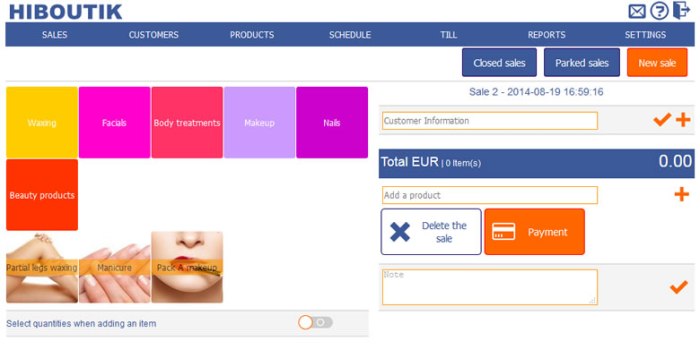Point of sale software hair salon – Running a successful hair salon requires more than just skilled stylists. Efficient management of appointments, inventory, and finances is crucial for profitability and growth. A robust point of sale (POS) system can streamline these processes, allowing salon owners to focus on providing excellent customer service. This comprehensive guide explores the essential features of POS software tailored for hair salons, helping you make an informed decision.
Understanding the Needs of a Hair Salon POS
Unlike a retail store, a hair salon has unique operational needs. A good POS system for a hair salon should address these specific requirements:
- Appointment Scheduling and Management: Accurate scheduling is paramount. The system should allow for easy booking, rescheduling, and cancellation of appointments, ideally with integrated reminders.
- Service-Specific Pricing: Hair salons offer various services (cuts, colors, styling). The POS must accommodate different service prices and pricing variations based on stylist, product, or package.
- Inventory Management: Tracking hair products, tools, and supplies is vital. The system should allow for real-time inventory updates and alerts for low stock.
- Client Management: Storing client details, service history, and preferences is essential. This allows for personalized recommendations and targeted marketing.
- Payment Processing: Handling various payment methods (credit cards, debit cards, cash) is crucial. The system should be secure and compliant with payment regulations.
- Reporting and Analytics: Generating sales reports, service trends, and stylist performance metrics provides valuable insights for strategic decision-making.
- Integration with other tools: Seamless integration with scheduling software, marketing platforms, and loyalty programs can further streamline operations.
Key Features to Look For in Hair Salon POS Software
When evaluating POS options, consider these key features:
Appointment Scheduling and Management, Point of sale software hair salon
A robust scheduling module allows for efficient appointment management, including automated reminders, seamless rescheduling, and integration with online booking platforms.
Service-Specific Pricing and Customization
Hair salon POS software should offer flexibility in pricing and service customization, allowing for different price points, add-ons, and package deals based on stylist and service type. This is essential for maximizing profitability.
Inventory Tracking and Management
Effective inventory management is crucial for hair salons. A good POS system will track product quantities, expiry dates, and reorder points, preventing stockouts and ensuring optimal product availability. Tracking product usage by stylist can also be helpful.
Client Relationship Management (CRM)
Building strong client relationships is key. A CRM feature helps store client data, service history, preferences, and communication history, facilitating personalized service and targeted marketing campaigns.
Payment Processing and Security
Secure and reliable payment processing is critical. The system should support various payment methods, including credit cards, debit cards, and cash. Compliance with PCI DSS standards is a must.
Reporting and Analytics
Comprehensive reporting capabilities provide valuable insights into salon performance. This includes sales reports, service trends, stylist performance metrics, and profitability analysis. These insights allow for data-driven decision-making and strategic growth.

Source: possmartly.com
Top POS Software Options for Hair Salons
Several POS systems cater to the unique needs of hair salons. Researching different options is important. Some popular choices include [mention a few reputable salon-specific POS systems here, e.g., Salon Iris, Lightspeed POS, etc.].

Source: pos-software-free.com
Choosing the Right Fit
Consider your salon’s specific needs and budget when evaluating different POS options. Don’t be afraid to get quotes and test-drive the software before committing. A free trial or demo is a valuable way to assess the system’s usability and features. Also, look for a system with excellent customer support.
FAQ: Point Of Sale Software Hair Salon
- Q: How much does hair salon POS software cost?
A: Pricing varies greatly depending on the features, functionalities, and the provider. Contact different vendors for detailed quotes.
- Q: Can I integrate my current salon software with a new POS system?
A: Many POS systems offer integrations with popular scheduling and CRM tools. Check the system’s compatibility with your current software.
- Q: What are the benefits of using POS software for my hair salon?
A: Streamlined operations, improved efficiency, better customer service, enhanced financial management, and data-driven decision making are key benefits.
- Q: Is there any free hair salon POS software available?
A: Some basic POS software options might offer a free or limited-feature version. However, for a comprehensive solution, paid software is often more robust.
Conclusion
Investing in a well-suited POS system is a strategic move for any hair salon looking to thrive in today’s competitive market. By carefully evaluating your salon’s needs, researching different options, and understanding the key features, you can select a POS solution that will improve efficiency, enhance client satisfaction, and drive profitability.
Call to Action
Ready to elevate your hair salon’s operations? Contact us today for a free consultation to discuss your specific needs and find the perfect POS solution for your salon.
Query Resolution
How much does point of sale software for hair salons typically cost?
Pricing varies greatly depending on the features offered, the number of users, and the chosen subscription model. Contacting providers directly for personalized quotes is recommended.
Can the software be customized to fit specific salon needs?
Many providers offer customization options to tailor the software to specific salon workflows and requirements. Check with potential vendors about their flexibility and add-on possibilities.
What security measures are in place to protect client data?
Reputable providers employ robust security protocols, including encryption and data backups, to safeguard client information. Look for certifications and security details in vendor information.